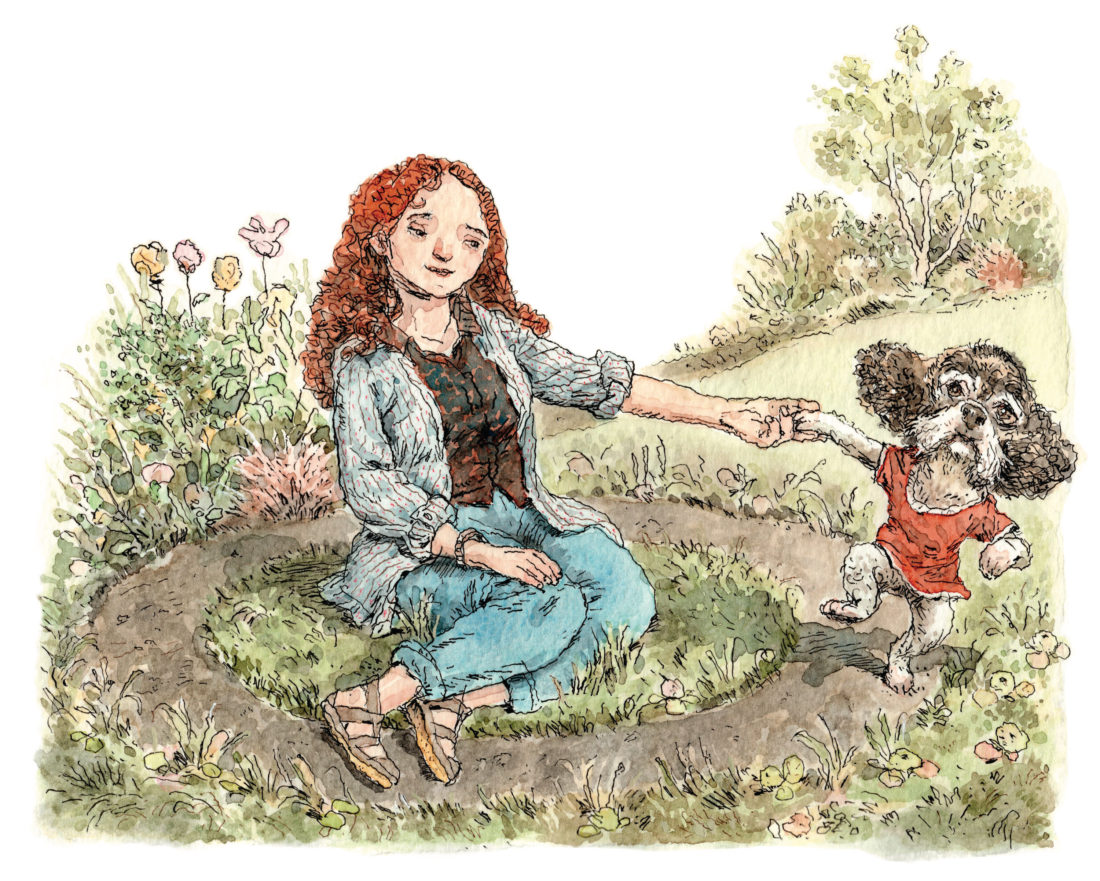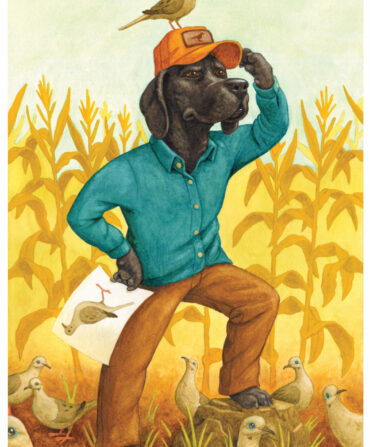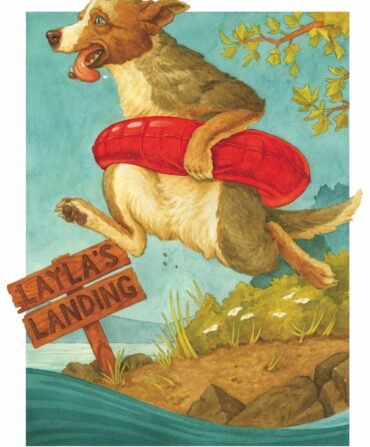Somewhere, there is the memory of a portal. It is the dog door he uses every day, and it will shuttle him from the inner sanctuary of the house out into the sunlit yard, if only he can find it. He looks for it in the belly of the kitchen cabinet, in the steel shine of the freezer, in the crevice beside the dryer. He searches and sniffs, his round, brown eye wide under the fringe of hair he hasn’t let me trim since losing the other eye a year ago.
My husband sits at the kitchen island scrolling through his phone. The tick tick tick of toenails on hardwood sounds like little bombs going off in my head, but it doesn’t breach the barrier of his consciousness. I watch them both as I stand at the sink peeling vegetables for dinner, and when I can’t take it any longer, I sigh loudly. Theo needs out, I say. Without looking up, my husband puts down his phone, scoops up the dog, carries him down the steps to the yard, comes back in, sits down, and picks up his phone again. A minute later, Theo bursts back in through the dog door and skids across the floor into my legs. The way in is not a mystery. Only the way out is lost.
I met Theo online. The last of my dogs—there had been seven over the years—had died six months earlier, and I’d been without one for the first time in three decades. It was time, I told my husband, who had asked for a single dog-free year to travel and regroup. I had reluctantly agreed, but five months in I was already obsessively scrolling cocker spaniel rescue sites. By the time I discovered Theo through Life’s Little Paws, he was six years old and had been living in a South Georgia kennel for months, waiting for someone to want him. My husband and I drove the three hours from our home in Chattanooga to get him. When they brought Theo out, I couldn’t believe how beautiful he was. My little supermodel, I would call him, although others would say he resembled Wilford Brimley. Look at those long ears! Those gigantic brown eyes! When we got home, Theo ran to the middle of the yard and rolled in the grass for the better part of an hour, mouth open wide, ears flopping, his bright white coat flashing in the sun like the underbelly of a trout.
These days, he’s less active. Our walks are a slow dance—a meditation. The time spent on scents expands to fill an afternoon. He stumbles on the smooth pavement. Is startled every day by the same fire hydrant. Offers nothing but a blank stare when the UPS truck roars by. He hasn’t barked, I realize, in months.
The change was gradual. So gradual, in fact, that it took me a while to realize something was wrong. Used to be, he would wake in the morning, fly off our high bed, and race into the kitchen, where he would commence a sharp and joyful barking—breakfast! Now! As time went by, he woke more slowly, until, I don’t know when exactly, we had to start waking him for breakfast. Where he once thrilled to walks, he would now only go obligingly. He was ten by then, no longer young, but not old either. Finally, we went to the vet.
Canine cognitive dysfunction, he said. Dementia. A few minutes into our strolls, Theo begins to spin. Every ten or twelve paces he stops and twirls, a series of steps executed so deftly it does not impede our forward progress. If I fight him, he will balk, so I hold his leash out wide, and down the hill and around the duck pond we go, for two full miles—walk-stop-pirouette, walk-stop-pirouette, a pas de deux for woman and dog. I imagine people passing in their cars or watching from their houses, wondering about this strange ballet.
Back home I try to feed him. Some days he will eat roasted chicken or canned beef liver, torn into narrow strips or balled up in my hand and pushed bite by bite into his mouth. Other days he doesn’t understand food, what his mouth is for, or how one relates to the other. Sometimes while I am feeding him, he will walk away, tick tick ticking through the kitchen to the door, where he’ll wait, head down, body swaying, long ears brushing the floor. I dry my hands on a dish towel, follow him, squat down. Where are we going? I ask. Who are we waiting for? I am always in on his plans. Not very far in the future, I will separate my will from his, and steel my heart against the terrible plan I must make. For now, I guide him back to his bed, where he spins, once, twice, fifteen times, then lies down and sleeps the sleep of the dying.
Nights, my husband and I corral Theo inside the fence of our legs to keep him from falling off the bed. I love the feel of his tight, warm body against the back of my thighs, the sweet, dark smell of his slumber, the metronome of his breath; but with every shift or shiver, I bolt upright, ready to catch him midfall or whisk him outside before he can wet the bed.
It is the smallest thing, taking care of ailing dogs. It is building ramps in place of stairs. It is lifting brittle bodies onto beds. It is pushing pills down unwilling throats while your own catches with equal parts gratitude and regret. It is remembering how, when they were new, they blazed their bright and boisterous way into all the graceless places of your heart, and it is knowing in those moments that it will be you who will show them the way out.
I try to appreciate that things are not worse than they are. I have watched a dog with lung cancer struggle to breathe. I have found a dog with heart failure drowned in his own fluids in the spare bedroom. This is not that, and for a little while I feel some relief. It can’t last, of course. What aches in the moment is always more tender than what’s already grieved.
One day I read that Theo’s spinning could be something called positional vertigo, the result of calcium buildup in the inner ear. There is a medication that might help. For an entire weekend I float on a raft of possibility. Perhaps the dementia is in fact only dizziness! I take the vet my findings. I read from the original text as he listens, leaning against the counter with the ear swabs and the plastic heartworm model, looking older than I remember. In years past I came seeking cures for the lung cancer, the heart failure; once, I brought my dying dog in for a toenail trim, certain this small act of hygiene was a gateway to more and better years. When I finish reading, I look up. The vet’s face is an apology.
I will release Theo. Not now, but a month from now. On that day my husband will lay him in my lap, and we will talk to him and rub his back and ears, and when the first needle goes in, he will sink into me, dense and heavy with sleep. Soon his head will drop, and with the second needle he will take a deep, vast breath and grow still. I will know then that he has found his way out, and I will close my eyes and watch him go, boundless and lithe and no longer lost, pirouetting, pirouetting, into a sunlit yard.









